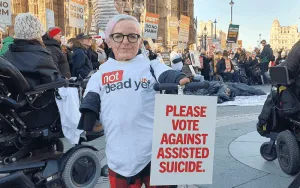
First UK Bus has won praise from RNIB after joining local operators Reading Bus and Kinchbus in signing the bus charter, which was launched this week at First’s depot in Chelmsford, Essex.
We’re On Board was developed by RNIB after the success of its Stop For Me, Speak To Me campaign, which saw it link up with bus operators across the UK for events in which bus drivers swapped places with blind and partially-sighted customers, with passengers sitting in the driver’s seat and drivers trying on glasses that simulated sight loss.
RNIB’s chief executive, Lesley-Anne Alexander, wrote last week to all of the major bus operators, asking them to back We’re On Board.
And at the end of April, the charity will post a copy of the charter and a DVD of a film about the campaign to every bus depot in England. RNIB in Scotland, Wales and Northern Ireland will also be adapting the charter.
Natalie Doig, an RNIB campaigns officer, said the charity was happy to share the charter with other disability groups that might also need to address issues with the training of bus drivers in disability equality.
She said: “A lot of the things in the charter would help many people, not just disabled people, but older people, women with buggies.
“We are here to represent blind and partially-sighted people but the stuff we are doing will have a much wider impact on other groups.”
Baroness Kramer, the Liberal Democrat transport minister, called on all bus operators to sign up to the charter’s 13 principles.
And she told the launch event that she was “keen to make progress” on calls by campaigners for compulsory audio-visual announcement technology on buses, and disability equality training for drivers.
She suggested that the “extremely prohibitive” cost of smartphones and the “rapid pace of innovation” in the mobile phone industry would make it difficult for many blind and partially-sighted passengers to take advantage of the smartphone technology that bus operators were keen to develop and promote to assist them.
She said: “Given the obvious benefits of audio-visual announcement systems to blind and partially-sighted passengers, I am keen that operators and local authorities invest in this technology for their buses, where possible.”
Last June, her predecessor as transport minister, her Liberal Democrat colleague Norman Baker, said he was “not at the moment inclined” to make audio-visual technology a mandatory requirement because of the “cost and the impact on services” but said he had “encouraged” the bus industry to introduce it and would “monitor how they are getting on”.
Baroness Kramer said she had now written to the Confederation of Passenger Transport to ask bus operators to “work with manufacturers of audio-visual technology to examine the potential for simpler and more affordable systems for buses” and “think creatively about what can be achieved”.
And she said she was “looking into the possibility of research initiatives involving small businesses and academic institutions to encourage further innovation”.
Baroness Kramer said the government was also reviewing the UK’s decision to provide a five-year exemption to bus drivers from the mandatory disability equality training requirement contained in European Union legislation on passenger rights.
It was one of a series of exemptions to new European bus and coach access rules taken advantage of by the coalition last year.
Baker said last year that he would review the exemption from mandatory training after a year, to check on industry progress with voluntary measures, as a result of “concerns from the public”.
Baroness Kramer told the launch: “I’ve asked bus and coach operators to explain how they monitor and evaluate the effectiveness of their disability awareness training and to provide some examples of good practice.
“I have also sought feedback from disability groups and charities, including the RNIB.
“If the results show that progress is not being made on disability awareness training, we will examine options and propose a plan of action.”
She added: “Bus operators need to ensure, as many do already, that their drivers fully understand the important role they play in the lives of blind and partially-sighted people.
“Buses are a lifeline for blind and partially-sighted people.”
And she called on companies to “embrace” RNIB’s charter, which she said would “bring more independence, choice and control to passengers”.
Doig said Baroness Kramer’s comments on audio-visual information were “interesting”, and that RNIB supported her call for the bus industry to explore new technologies, while it had submitted evidence to the Department for Transport “on enacting the EU regulations on mandatory disability awareness training for bus drivers”.
She added: “We want to see all bus drivers receive good quality disability awareness training.”
First runs about one in five local bus services, and has a fleet of about 6,500 buses, carrying approximately 2.3 million passengers every day across the UK.
Giles Fearnley, managing director of First UK Bus, said the company was also working with other disability groups to improve its service to disabled passengers.
He said that every one of First’s 17,000 drivers was receiving training on how they could ensure their buses were accessible to blind and partially-sighted customers.
2 April 2014

 This bill opens the door to scandal, abuse and injustice, disabled activists say after assisted dying bill vote
This bill opens the door to scandal, abuse and injustice, disabled activists say after assisted dying bill vote Making all self-driving pilot schemes accessible would be ‘counter-productive’ and slow us down, says minister
Making all self-driving pilot schemes accessible would be ‘counter-productive’ and slow us down, says minister New figures show legalising assisted suicide is not safe, with government preparing to cut billions from benefits
New figures show legalising assisted suicide is not safe, with government preparing to cut billions from benefits